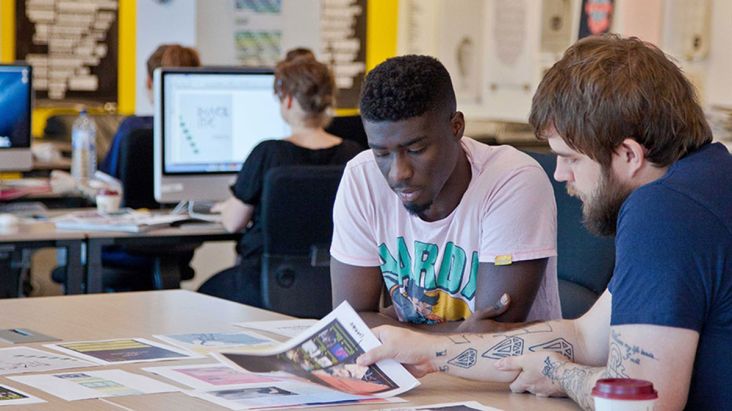Don’t even think about becoming a freelancer unless you have these 20 essential skills
Brilliance in your chosen field won’t be enough to make a successful career of freelancing. There’s a host of other essential skills you need in your locker. How many have you got?

Image licensed via Adobe Stock
Check out Creative Boom’s guide to the 20 soft skills you need to make a lucrative, long-term go of creative freelancing.
1. Emotion regulation
Being able to manage negative emotions such as anger and frustration is vital – but equally important, can you reign in positive emotions, like excitement?
Freelancing can be exhilarating, but during the most exciting times, there will likely be less thrilling work going on too. You need to be able to switch off the adrenalin-fuelled, chicken-counting and get on with your day.
Owning your emotions will help keep up the same energy and dedication on all of your projects, whatever the circumstances going on around you.
2. Self-confidence is a preference
“The moment you doubt whether you can fly, you cease forever to be able to do it.” J.M. Barrie, Peter Pan
On the flip-side, believe you’ve got what it takes, and you’re most of the way there. Genuine self-confidence is the most powerful tool in a freelancer’s locker: it’s the number one building block of happiness and success. If you’re struggling in this area, consider hypnotherapy. It works.
3. Growth mindset / natural-born lemonade-maker
You must get on board with seeing difficult situations as a gilt-edged chance to grow, learn new skills and be a better person. Never looking to blame or change anyone but yourself – keeping the focus on self-improvement – is the only way you’ll be able to persevere and thrive long term.
4. Patience in the waiting game
As an independent trader, your organisational decision-making is fast and precise. The companies you’ll be working with, and the companies they are working with aren’t always like that. Decisions are multi-level, multi-stakeholder. Everything takes ages. Just because you haven’t heard anything for a while, it doesn’t mean the project is cancelled or your portfolio’s in the bin.
5. Stress management and self-awareness
Know yourself, and know what stresses/de-stresses you. A bad night’s sleep or a stupid argument with your partner will detract from clear thinking – and clear thinking is your best hope of getting through whatever situation is stressing you out.
A half-hour of old school Snoop Dogg while thrashing the peddles off an exercise bike (or insert your equivalent here) is more useful than another five hours’ bleary-eyed grafting on the laptop, I promise you.
6. Forgive-and-forget-ability
Be able to forgive those who’ve wronged you, the most likely candidate being YOU. ‘Letting yourself off’ for a mistake will allow you to ditch the emotional baggage and move on, productively. Something to think about on the exercise bike, maybe?
7. Communication
Flair for articulating your ideas verbally, in writing and diagrammatically, is essential if you want your ideas to sink into peoples’ brains. You should be able to communicate strategically, in a way that supports your end goals. And never forget the number one communication skill, the one all others are built upon: listen when people speak.
8. Perceptiveness
It’s useful to have a keen eye for the nuances and non-verbal cues in other peoples’ conversations and actions. You have to be a hawk-eyed, bat-eared active listener to get a handle on people’s actions and intention. You need to be a voracious reader-between-the-lines to make it in the freelance game.
9. Teamwork
Freelancing brings you in to contact with all sorts of different skill sets, personality types, work styles and motivation levels. You have to be ready to get the best out of them all.
10. Interpersonal relationship skills
Identify common ground, build trust and have empathy
"If you can learn a simple trick, Scout, you'll get along a lot better with all kinds of folks. You never really understand a person until you consider things from his point of view until you climb inside of his skin and walk around in it." Atticus Finch in To Kill a Mockingbird (1962)
In business, a good dose of empathy can help you stand out. As Barrack Obama says: "The biggest deficit that we have in our society and the world right now is an empathy deficit. We are in great need of people being able to stand in somebody else's shoes and see the world through their eyes."
11. Presentation skills
You are going to have to give presentations. They need to be captivating, incite input and motivate your desired outcome. Your ability to present, sometimes when you didn’t even know you’d be presenting until the last minute, will be vital to your success as a freelancer.
12. Leadership skills
Defining and communicating a vision that others get on board with and want to be a part of a crucial skill. You might not be the official leader, but as the vanguard of creativity, you could find yourself as the de facto leader, until someone says otherwise.
13. Meeting management
Time is money and meetings waste time – ergo, meetings waste money. If they are not well managed, that is. Keeping meetings brisk and on-topic, without being rude about it, is an important skill to master if you don’t want precious hours eaten up by unproductive sit-downs.
14. Facilitating skills
Seeking out and collating feedback and opinions into one easily-digestible format that proffers a solution to satisfy all stakeholders – a toughie, but all in a day’s work for a creative freelancer.
15. Selling
If you’re uncomfortable selling, you’re in the wrong gig. For a freelancer, life’s a pitch – you are going to be selling ideas and building buy-in, the whole time. The other vital sales skill is selling yourself: bigging yourself up is hard, you need to learn to do it subtly, without coming across as being irritatingly full of yourself. It’s a fine line.
“If being an egomaniac means I believe in what I do and in my art or music, then in that respect you can call me that... I believe in what I do, and I'll say it.” John Lennon
16. Influence and persuasion
Very similar to selling, influence is the concept of bringing people round towards a decision you’d like them to make, without them feeling they’ve been sold to. The best influencers can get someone to think an action was their idea, when in fact they’d been subtly pointed towards it by an artful influencer. What kind of voodoo do you do?
17. Negotiation
From a freelancer perspective, negotiation is understanding different stakeholder motivations and finding win-win solutions for all, which you happen to be an indispensable ongoing part of. It’s about much more than setting rates. If you’re serious about freelancing, read up on negotiation and practise every day.
18. Mentoring and coaching
As the incoming expert, your role comes with a lot of responsibility – you have to be ready to provide constructive criticism, guidance and feedback to help those around you develop from your skills and experience.
19. Skilled at dealing with difficult personalities and situations
You’re not going to get on with everyone; if you’re going to succeed, you need to be able to produce great work when collaborating with people you don’t necessarily like. How do you deal with that? Staying calm, thinking on your feet and keeping your brain organised and articulate when things are getting hectic is all you can do. That’s your chance to shine, so be prepared!
20. Savvy in handling office politics
You’re going to be in and around offices, and they tend to be highly politicised. You need to be able to quickly get to grips with the interpersonal dynamics and figure out how to play it. Office politics are a fact of life, even for those whose office is a kitchen table.




 by Tüpokompanii](https://www.creativeboom.com/upload/articles/58/58684538770fb5b428dc1882f7a732f153500153_732.jpg)


 using <a href="https://www.ohnotype.co/fonts/obviously" target="_blank">Obviously</a> by Oh No Type Co., Art Director, Brand & Creative—Spotify](https://www.creativeboom.com/upload/articles/6e/6ed31eddc26fa563f213fc76d6993dab9231ffe4_732.jpg)
















